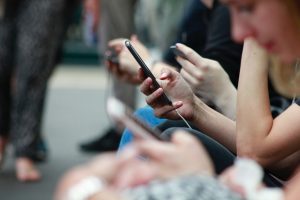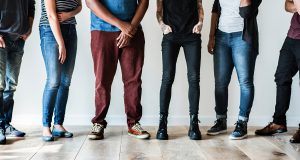By Carolyn Digby
Something I have been thinking about lately is how eating disorder recovery is represented in recovery stories. On the internet and on social media platforms, stories of recovery are shared and intended as motivation for those struggling to seek recovery; I actually wrote a blog post last year examining Instagram accounts which outline eating disorder recovery. This has been partly inspired by my current coursework and area of interest, as well as my own background. When I was having my own struggles, such platforms and means of connecting with others simply did not exist (or I was not aware of them!), and I find myself fascinated by the connections made through sharing stories of recovery. I have even written my own, which was published on this blog a few years ago. I found the process therapeutic, and it made sense for me at the time. Did it truly help anyone else, though?
I completely see the benefit of connecting with others as a means of validating our experiences and providing motivation, however I was always left with this weird feeling that was hard to pin down after I perused recovery stories as an adult many years after my recovery, no matter what the medium. While I applaud the bravery of anyone who chooses to share their story, there are a few concerns on the broader spectrum of eating disorder recovery.
 It seems like recovery stories (and eating disorder media coverage generally) can fall into a few different camps. Some show alarming graphics and use scare tactics as a means of frightening their readers into considering recovery, or simply for shock value. Some focus on only the food aspect. Some show only positive sides of recovery, not painting a true view of what is going on behind their words or images. Some provide useful information for those struggling and share personal information of what helped the writer or creator recovery. Some are simply for self-exploration and for a therapeutic release, and there is nothing wrong with that. Some are raw, vulnerable, and realistic accounts of what it truly means to have an eating disorder and what recovery could look like.
It seems like recovery stories (and eating disorder media coverage generally) can fall into a few different camps. Some show alarming graphics and use scare tactics as a means of frightening their readers into considering recovery, or simply for shock value. Some focus on only the food aspect. Some show only positive sides of recovery, not painting a true view of what is going on behind their words or images. Some provide useful information for those struggling and share personal information of what helped the writer or creator recovery. Some are simply for self-exploration and for a therapeutic release, and there is nothing wrong with that. Some are raw, vulnerable, and realistic accounts of what it truly means to have an eating disorder and what recovery could look like.
However, we are then brought to a problem that is not often openly acknowledged within eating disorder recovery, perhaps because it is uncomfortable. Resoundingly, it appears one demographic is more heavily represented than the rest: the young, White, heterosexual, cisgender woman, who usually comes from a fairly wealthy background. For the past month, I have been gathering information of the impact of pro-recovery Instagram accounts on their viewers’ attitudes towards recovery, and the academic literature has repeatedly demonstrated that non-dominant groups suffer a lack of representation within eating disorder recovery, which can lead to a multitude of problems, including an increase of experienced loneliness and further barriers to seeking treatment. Andrea Lamarre, with her incredibly interesting research, sheds light into the issue:
While we know that eating disorders don’t discriminate and can affect every single population, this prominent featuring of young White woman through eating disorder recovery can do a huge disservice to those who do not identify with this image. Although I am a member of this demographic, most of the people I’ve connected with who have recovered from or struggle with eating disorders do not fit this identity. That makes me wonder, are recovery stories where heterosexual White women are overwhelming represented helpful for those who do not resonate with this image?
Recovery is such a unique process, and universally I think everyone just wants to be at peace with themselves, but this shows up differently for everyone and how this is achieved can vary so greatly depending on culture, background, and identity.
 Recovery is such a unique process, and universally I think everyone just wants to be at peace with themselves, but this shows up differently for everyone and how this is achieved can vary so greatly depending on culture, background, and identity. Some recovering from eating disorders may have to deal with additional adversity that is not addressed in many recovery mediums, such as inability to access treatment due to finances, dealing with different cultural rituals surrounding food, potentially not having family support because they are a member of the LGBTQ community, or not being admissible to some treatment programs because they are outside of the age range of admittance.
Recovery is such a unique process, and universally I think everyone just wants to be at peace with themselves, but this shows up differently for everyone and how this is achieved can vary so greatly depending on culture, background, and identity. Some recovering from eating disorders may have to deal with additional adversity that is not addressed in many recovery mediums, such as inability to access treatment due to finances, dealing with different cultural rituals surrounding food, potentially not having family support because they are a member of the LGBTQ community, or not being admissible to some treatment programs because they are outside of the age range of admittance.
As a young, White woman myself, I can never fully grasp what it would be like to not have myself represented in the media, let alone within eating disorder recovery. The closest I can come is to remember how alone I felt within my eating disorder, desperate to connect with others who felt similar to me. I do recall reading books of recovery and seeing eating disorders represented in movies and television shows, and they were all people who looked and acted like me (well, maybe not exactly, but in terms of sharing a similar demographic, yes!). Wouldn’t that feeling of loneliness be even worse if you couldn’t find yourself represented within recovery?
Even if reading recovery stories or viewing recovery content may not be suitable for everyone, why isn’t a realistic picture painted of those who suffer from eating disorders? I imagine it would not be easy for someone who fits this very narrow picture of an eating disorder to put themselves out there, without having much other representation.
But what does this mean exactly? We can’t control the content that gets put out there, nor is anyone owed your story. I am not in a position of making recommendations on behalf of others or telling people what to do, since eating disorder recovery is a customized journey which should utilize and hone in on what is unique to you, harnessing your own strengths. Even writing this, I wonder what gives me the right to speak up about this issue or if I even should, as I am in a position of privilege in this arena because I am so widely represented. How could I relate? Well, I can look critically at how my demographic may contribute to the problem, whether it be intentional or not. I do think we can talk to each other more and critically evaluate the messages we are receiving from the media and within recovery stories about what recovery looks like, and who recovers. We can put the issue out in the open. We can be allies with others who suffer from unequal representation, having an open mind and being willing to learn from everyone.

Carolyn is currently completing graduate school, and working towards becoming a certified counsellor specializing in women’s mental health issues. In her spare time, she loves cuddling with her cat, reading, writing, and the outdoors.